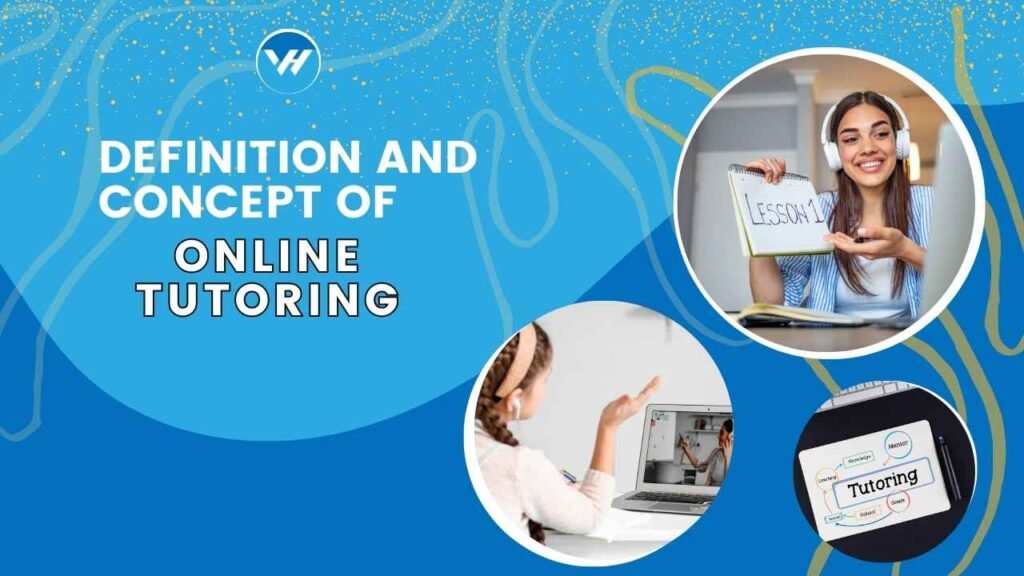Online tutoring is a modern approach to education where students receive academic assistance via digital platforms. Unlike traditional face-to-face tutoring, online tutoring leverages technology to facilitate learning from anywhere in the world. This form of tutoring utilizes various tools such as video calls, chatrooms, and interactive whiteboards to provide real-time assistance and support.

Table of Contents
ToggleImportance of Online Tutoring in Today’s World
In our increasingly digital age, online tutoring has become an essential part of the educational landscape. It offers a flexible, accessible alternative to conventional learning methods, making it easier for students to get the help they need without being restricted by geographical or temporal limitations. With the rise of remote learning, online tutoring has proven to be a vital resource for both academic achievement and personal development.
The Evolution of Tutoring
Traditional Tutoring vs. Online Tutoring
Traditional tutoring involves face-to-face interactions between a tutor and a student, typically conducted in a physical setting such as a classroom or a private study area. Online tutoring, however, transcends these boundaries by enabling virtual interactions through digital platforms. This shift from physical to virtual spaces has been driven by advancements in technology and the growing demand for more flexible learning solutions.
The Rise of Digital Education Tools
The rise of digital education tools has revolutionized how tutoring is conducted. From simple video conferencing apps to sophisticated learning management systems (LMS), these tools have transformed the educational experience, providing both tutors and students with enhanced capabilities for interaction and learning. The integration of digital tools has made online tutoring more engaging, efficient, and effective.
Key Concepts of Online Tutoring
Virtual Learning Platforms
Virtual learning platforms are the backbone of online tutoring. These platforms offer a range of features such as video conferencing, file sharing, and interactive whiteboards, all designed to facilitate a seamless educational experience. They provide a virtual space where students and tutors can connect, collaborate, and communicate effectively.
Interactive Learning Environments
Interactive learning environments are designed to engage students actively in their learning process. Online tutoring platforms often include interactive elements like quizzes, polls, and collaborative activities that help maintain student interest and participation. These tools enable a more dynamic and immersive learning experience.
Personalization and Customization in Online Tutoring
One of the key advantages of online tutoring is the ability to personalize and customize the learning experience. Tutors can tailor their lessons to meet individual student needs, adjusting the pace and content according to each student’s unique requirements. This level of personalization helps address specific learning challenges and enhances overall educational outcomes.
How Online Tutoring Works
Setting Up an Online Tutoring Session
Setting up an online tutoring session typically involves scheduling a meeting through a tutoring platform or app. Students and tutors can arrange sessions at mutually convenient times, often through integrated calendar features. Once scheduled, the session can be accessed via a link or app that connects both parties in a virtual classroom.
Tools and Technologies Used
Online tutoring relies on a variety of tools and technologies to facilitate learning. These include video conferencing software (like Zoom or Microsoft Teams), digital whiteboards (such as Miro or Jamboard), and collaborative document editors (like Google Docs). These tools enable real-time interaction and resource sharing, making online tutoring as effective as in-person sessions.
Common Features of Online Tutoring Platforms
Common features of online tutoring platforms include video and audio capabilities, text chat, screen sharing, and recording options. Many platforms also offer additional resources such as practice exercises, educational games, and progress tracking tools. These features contribute to a comprehensive and interactive learning environment.
Benefits of Online Tutoring
Accessibility and Convenience
One of the most significant benefits of online tutoring is its accessibility. Students can access tutoring services from anywhere with an internet connection, eliminating the need for travel and allowing for a more flexible learning experience. This convenience is particularly valuable for students in remote areas or those with busy schedules.
Flexibility in Scheduling
Online tutoring offers flexible scheduling options that can accommodate various time zones and personal schedules. Students and tutors can arrange sessions at times that suit both parties, making it easier to fit tutoring into busy lives. This flexibility helps ensure that students receive the support they need when they need it.
Diverse Expertise and Specializations
Online tutoring platforms often feature a diverse pool of tutors with expertise in various subjects and fields. This diversity allows students to find specialized help in areas where they need it most. Whether it’s advanced calculus or creative writing, online tutoring makes it possible to connect with experts who can provide targeted assistance.
Enhanced Learning Resources
Online tutoring platforms frequently provide access to a wide range of digital learning resources. These can include interactive exercises, educational videos, and virtual simulations that enhance the learning experience. The availability of these resources supports diverse learning styles and helps students grasp complex concepts more effectively.
Challenges of Online Tutoring
Technical Issues and Connectivity
Technical issues and connectivity problems can sometimes hinder the effectiveness of online tutoring. Poor internet connections, software glitches, and device malfunctions can disrupt sessions and impact the learning experience. Ensuring reliable technology and providing support for technical issues are crucial for a smooth online tutoring experience.
Maintaining Student Engagement
Maintaining student engagement in an online environment can be challenging. Without the physical presence of a tutor, students may become distracted or lose focus. Tutors must employ strategies to keep students engaged, such as using interactive activities, providing regular feedback, and creating an engaging virtual classroom atmosphere.
Ensuring Effective Communication
Effective communication is essential for successful online tutoring. Without face-to-face interaction, it can be challenging to gauge student understanding and provide immediate feedback. Tutors need to use clear and concise communication methods, actively listen to students, and employ various tools to facilitate effective interaction.
The Future of Online Tutoring
Emerging Trends and Technologies
The future of online tutoring is shaped by emerging trends and technologies. Innovations such as artificial intelligence, virtual reality, and augmented reality are expected to enhance the online learning experience. These technologies can offer more immersive and interactive learning environments, providing students with new ways to engage with educational content.
The Role of Artificial Intelligence in Tutoring
Artificial intelligence (AI) is playing an increasingly significant role in online tutoring. AI-powered tools can provide personalized learning experiences, analyze student performance, and offer tailored feedback. AI can also help automate administrative tasks, allowing tutors to focus more on teaching and student interaction.
Choosing the Right Online Tutoring Service
Evaluating Tutoring Platforms
When choosing an online tutoring service, it’s important to evaluate various factors such as the platform’s features, tutor qualifications, and user reviews. Look for platforms that offer a range of subjects, interactive tools, and a user-friendly interface. Additionally, consider whether the platform provides customer support and a satisfaction guarantee.
Key Features to Look For
Key features to look for in an online tutoring platform include video conferencing capabilities, interactive whiteboards, and secure file sharing. Ensure that the platform supports seamless communication and collaboration, and check if it offers additional resources such as practice tests and educational materials.
Virtual Help: Revolutionizing Online Tutoring
Overview of Virtual Help
Virtual Help is a cutting-edge online tutoring platform designed to connect students with qualified tutors through an intuitive app. The platform offers a range of features, including video conferencing, interactive tools, and personalized support, making it a valuable resource for students seeking academic assistance.
Benefits of Using Virtual Help
Virtual Help provides several benefits, including 24/7 accessibility, a wide selection of tutors, and a user-friendly interface. The platform’s flexibility and comprehensive resources make it an excellent choice for students looking for convenient and effective tutoring solutions.
How to Get Started with Virtual Help
Getting started with Virtual Help is easy. Simply download the app from the iOS or Android store, create an account, and browse available tutors based on your needs. You can schedule sessions, access educational resources, and receive personalized support to help you achieve your academic goals.
Conclusion
Online tutoring has transformed the educational landscape by offering flexible, accessible, and personalized learning experiences. With its various benefits and innovative tools, online tutoring provides valuable support to students worldwide. The continued evolution of technology and the integration of platforms like Virtual Help promise to enhance the effectiveness of online learning further.
The future of online tutoring is bright, with ongoing advancements in technology and teaching methodologies. As digital tools and platforms continue to evolve, online tutoring will likely become even more integrated into mainstream education, offering new opportunities for students and educators alike.
FAQs
What are the main advantages of online tutoring?
The main advantages of online tutoring include accessibility from anywhere, flexible scheduling, a diverse range of expertise, and enhanced learning resources. These benefits make it a convenient and effective option for many students.
How do I choose the best online tutoring service for my needs?
To choose the best online tutoring service, evaluate factors such as platform features, tutor qualifications, user reviews, and available resources. Look for a service that matches your academic needs and offers a user-friendly experience.
Can online tutoring be as effective as in-person tutoring?
Yes, online tutoring can be as effective as in-person tutoring, especially when supported by interactive tools and a skilled tutor. The key is to ensure that the online platform provides a conducive learning environment and facilitates effective communication.
What technologies are commonly used in online tutoring?
Common technologies used in online tutoring include video conferencing software, interactive whiteboards, and collaborative document editors. These tools help facilitate real-time interaction and enhance the learning experience.
How does Virtual Help support students in their learning journey?
Virtual Help supports students by providing a range of features, including access to qualified tutors, interactive tools, and personalized support. The platform’s user-friendly app and comprehensive resources make it an effective solution for academic assistance.





